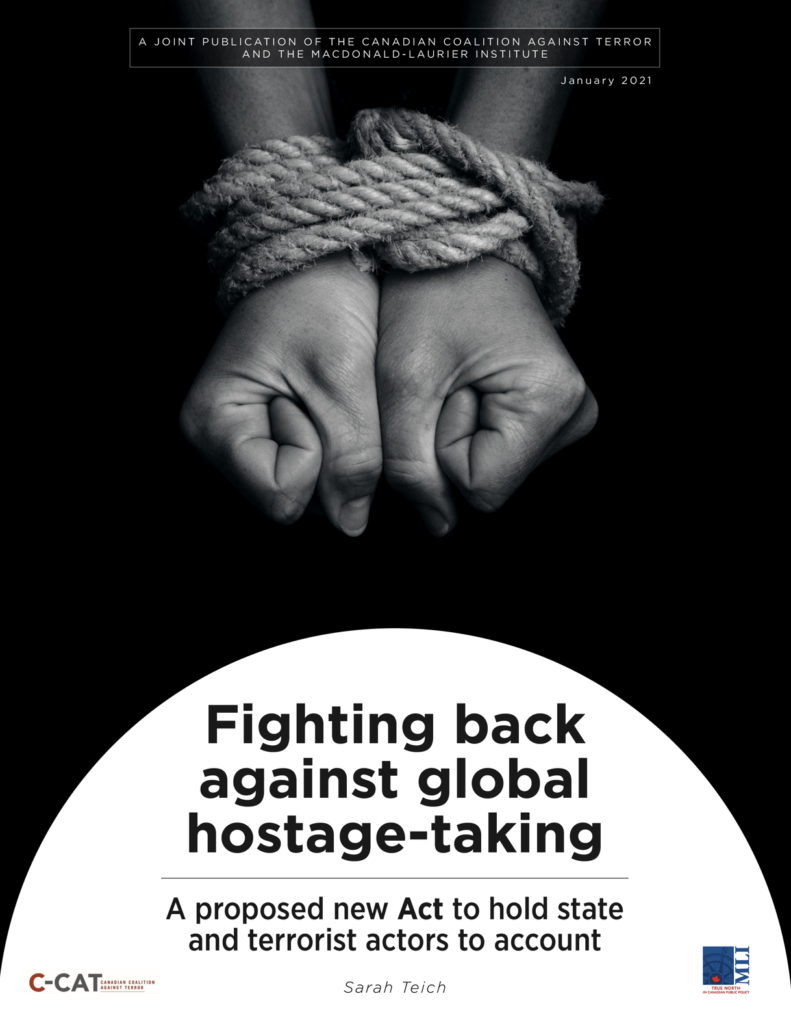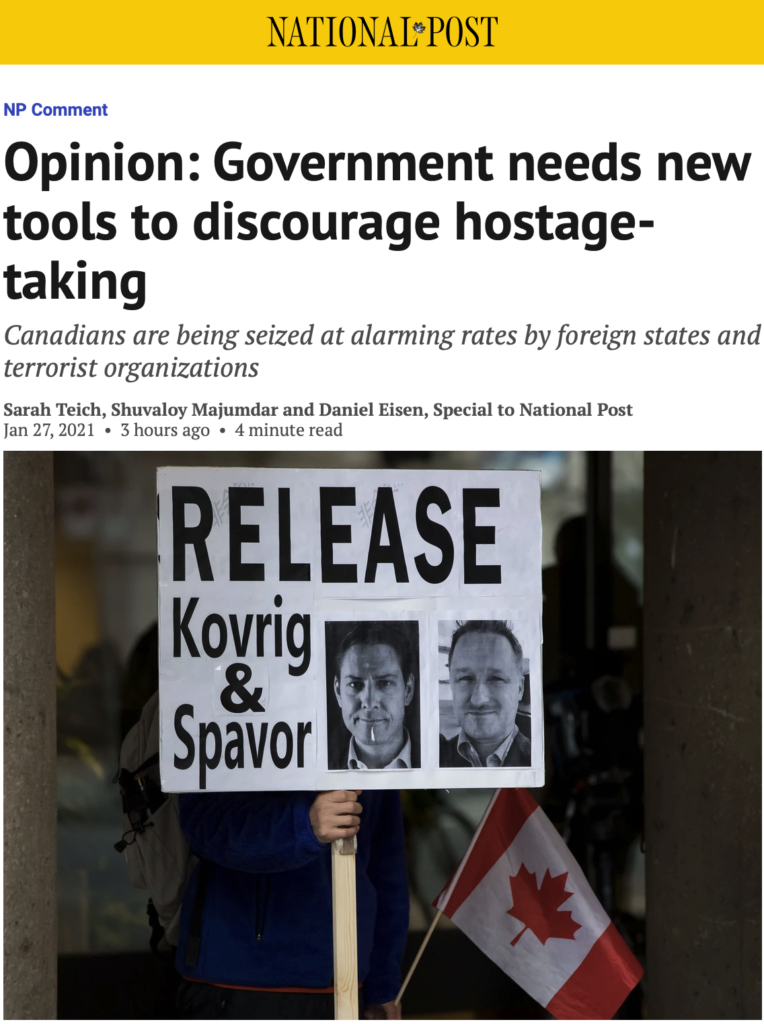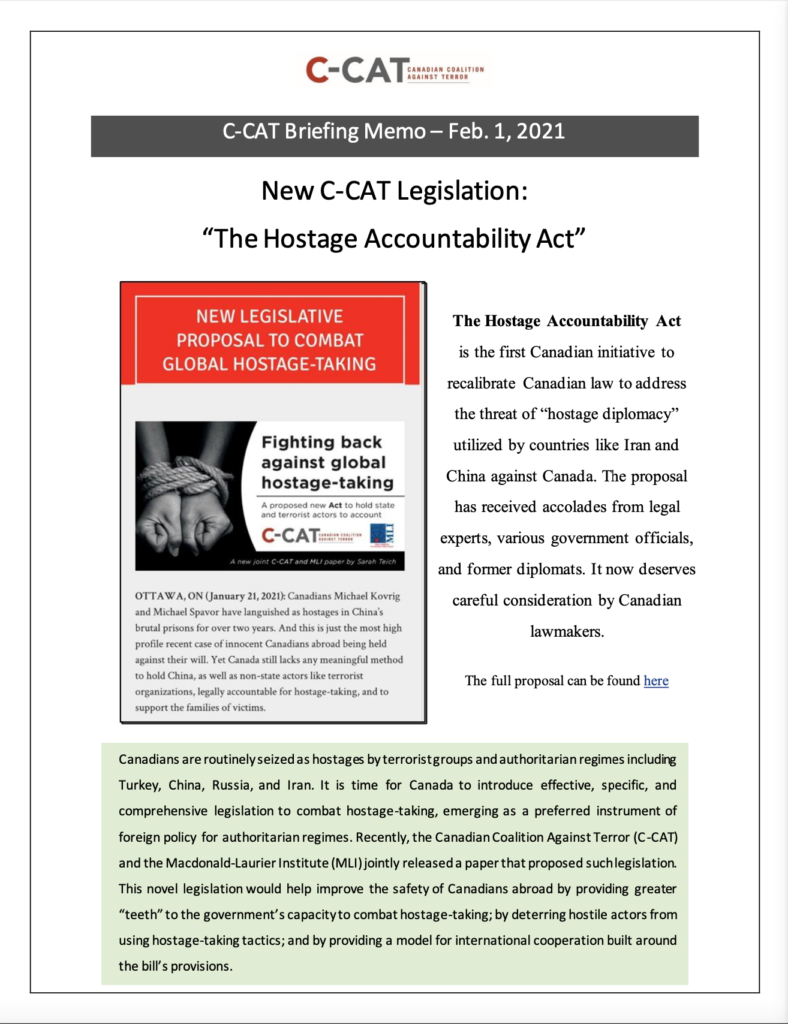Hostage Accountability Act: Fighting Back Against Global Hostage Taking Under Canadian Law
A proposed new Act to hold state and terrorist actors to account
New C-CAT Legislation: “The Hostage Accountability Act”
The Hostage Accountability Act is the first Canadian initiative to recalibrate Canadian law to address the threat of “hostage diplomacy” utilized by countries like Iran and China against Canada. The proposal has received accolades from legal experts, various government officials, and former diplomats. It now deserves careful consideration by Canadian lawmakers.
Key Points:
Canadians are routinely seized as hostages by terrorist groups and authoritarian regimes including Turkey, China, Russia, and Iran.
It is time for Canada to introduce effective, specific, and comprehensive legislation to combat hostage-taking, emerging as a preferred instrument of foreign policy for authoritarian regimes.
Recently, the Canadian Coalition Against Terror (C -CAT) and the Macdonald Laurier Institute (MLI) jointly released a paper that proposed such legislation.
This novel legislation would help improve the safety of Canadians abroad by providing greater “teeth” to the government’s capacity to combat hostage-taking; by deterring hostile actors from using hostage-taking tactics; and by providing a model for international cooperation built around the bill’s provisions.
Download the complete Hostage Accountability Act legislative proposal here:
Why Canada Needs This Legislation
Hostage Taking as Foreign Policy
Hostage taking has always been a key tool in the terrorist and criminal arsenal. But in recent times this practice has become almost normalized as a form of “diplomacy” employed by authoritarian regimes like Iran and China against western countries like Canada, Britain, and Australia. This low-cost high-yield tactic enables these regimes to inflict harm on democratic governments; extract political concessions; and promote their brands to both domestic and foreign audiences. Given the potential gains and the absence of any real consequence for the perpetrators, there is every incentive for the increased use of this tactic, which severely undermines Canadian security and sovereignty.
The Failure of Canadian Hostage Policy: “Comfort letters to families”
“The taking of Canadians as hostages has persisted, with Canadians being seized at alarming rates by foreign states and terrorist organizations. Despite the prevalence of these hostage situations, and despite ratifying the UN Hostages Convention in 1985, Canada has done shockingly little to address hostage-taking and hostage diplomacy. Canada complied with Article 2 of the UN Hostages Convention by criminalizing hostage-taking at home and abroad — and that’s it.
We don’t have any legislation that specifically addresses hostage-taking, and current Canadian policy with respect to hostage situations is distressingly unsupportive of the families of hostages, as revealed by a shocking eight-part Toronto Star investigation into the subject in 2016. Following the Star’s expose, the only adjustments the government made was to start providing “comfort letters” to families, reassuring them that they will not be prosecuted criminally if they hire a negotiator and designating two RCMP liaison officers to deal with the families.”
How This Legislation Works

The Hostage Accountability Act
Part One: empowers Canada to impose sanctions against foreign states and foreign nationals that engage in, or are complicit in, the hostage-taking of Canadian nationals. The types of sanctions that would be available mirror those that Canada uses in its Magnitsky Act. It would also enable Canada to apply these provisions when nationals of other countries are taken hostage. This creates a framework to expect similar support from others when Canada is facing a similar challenge. Notably, imposing sanctions under the Act is permissible, not mandatory, allowing Canada the flexibility to react according to the best interests of each particular hostage situation.
Part Two: provides a framework to ensure that the families of hostages receive consistent and reliable governmental support. It would impose various obligations to this effect on the government of Canada – to communicate with the families, to direct them to appropriate resources and support including mental health support, and to assist them in acquiring relevant information. This Part is partially inspired by, and responds to, a Toronto Star investigation from 2016 that exposed the inconsistent and inadequate nature of the government’s communications with the families of hostages.
Part Three: enables increased multilateral and bilateral cooperation, as well as cooperation with foreign nationals to successfully resolve Canadian hostage cases. This could provide Canada with more tools and invaluable intelligence by harnessing the importance of local partners in any given hostage situation.


